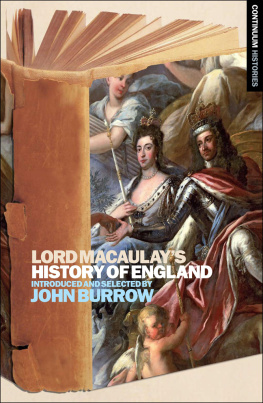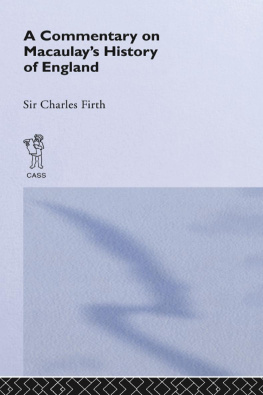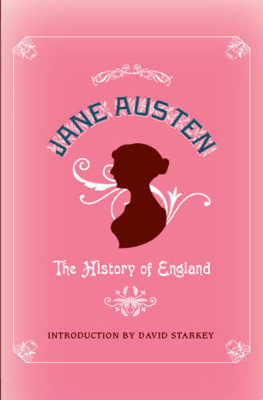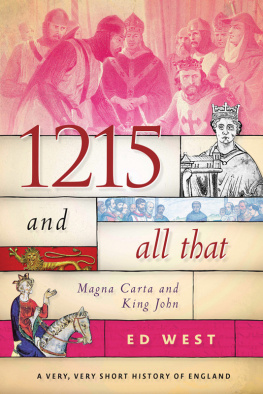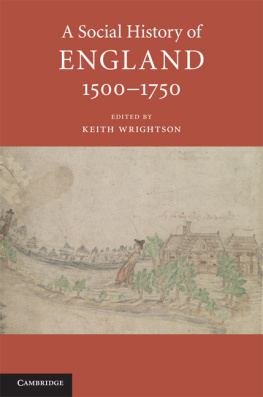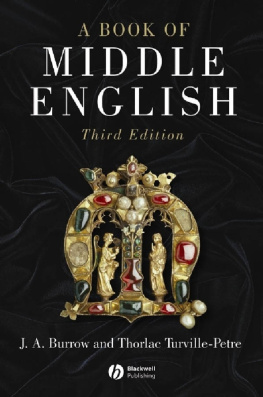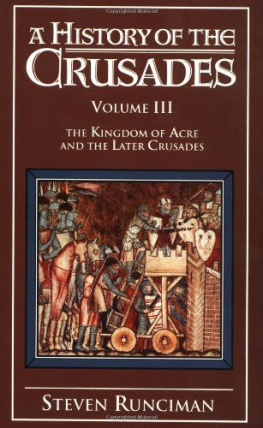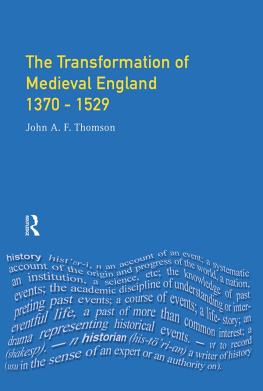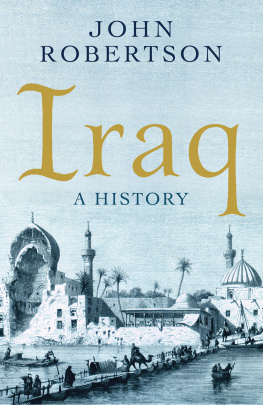Also in Continuum Histories
William H. Prescotts History of the Conquest of Mexico .
Introduced and selected by J.H. Elliott
J.A. Froudes The Reign of Mary Tudor .
Introduced and selected by Eamon Duffy
Edward Gibbons Decline and Fall of the Roman Empire .
Introduced and selected by Tom Holland (forthcoming)
Thomas Carlyles The French Revolution .
Introduced and selected by Ruth Scurr (forthcoming)
INTRODUCTION
W hen he was planning his History Macaulay wrote confidently, I really think that posterity will not willingly let my book die. Macaulay died in 1859, with only the part of the History up to the end of the reign of William III completed. The earlier part had, however, already achieved an extraordinary popularity when the opening volumes appeared in 1848. Macaulay was a celebrated essayist and Parliamentary orator, with an official career in India behind him as a member of its governing council, which, though it lasted only four years, procured him financial independence for life. His political career continued after he returned, and led to a peerage, but his attention was increasingly given to his History .
Macaulays published essays, second only in reputation to the History , are vigorous, sparkling performances, begun when he was a young man in the 1820s. It was through these, mainly in the Whig journal the Edinburgh Review , and through his speeches in the House of Commons on the Parliamentary Reform Bill in the early 1830s, that Macaulay first made his name. He was in many respects, in culture, temperament and career, the last of the great classical and neo-classical historians, who wrote the history of public events and personalities after holding high public offices. Many, from Polybius in the second century BC, to Viscount Bolingbroke in the eighteenth century, had regarded such a career as indispensable to a historian. Three Whig politicians in the early nineteenth century, Charles James Fox, Lord John Russell and Sir James Mackintosh from whom Macaulay inherited a valuable collection of seventeenth-century pamphlets had already written on The Glorious Revolution, as Whig tradition had come to call it.
Macaulay was well aware of his links with the ancient historians.The truth is, he wrote in his journal (7 December 1849), I admire no historian much except Herodotus, Thucydides and Tacitus. Modern historians, Hume, Robertson, Gibbon, Voltaire, had only merit. He felt a sense of kinship with Livy, whose re-telling of early Roman legends provided inspiration for his bravura narrative poems The Lays of Ancient Rome . His own culture was essentially classical, though he was also thoroughly familiar with the European literature of the eighteenth century. He continued to read the Greek and Latin classics throughout his life.
To Macaulay, after, as an undergraduate in Cambridge, he shed his fathers Toryism and fervent Evangelical Christianity, Whiggism was the foundation of his creed, though as always such a capacious term needs elaboration. Though he moved as a young man in the circle of the followers of Fox, he admired Burke more and despised the republican theoreticians of the seventeenth century as impractical and arrogant would-be oligarchs, as he did their later counterparts in the French Revolution. His own Whiggism was bourgeois, incorporating enthusiasm for material progress and combining zeal for reform with veneration for Englands long constitutional past. Whiggism stood for practical and moderate innovation, not doctrinaire panaceas. It combined progress with stability, which in the 1820s, when Macaulay entered politics, meant a cautiously enlarged franchise, administrative reform and the removal of the civil disabilities imposed on Catholics and Nonconformists, which were a legacy of the repressive legislation of seventeenth-century Anglican parliaments, fearful of Rome and hostile to Dissent. His History has much to say on this; in it his commitment to religious freedom was tempered by his belief that James IIs Catholicism, combined with aspirations to an autocracy like that of Louis XIV, was then a real danger to constitutional liberty.
Overt political partisanship in the History is muted by a sense that ultimately the interest of the population as a whole, in order and constitutional rule, transcended religious animosities and at moments of crisis was felt to do so. He therefore particularly celebrates the moments when, in 1688, the nation could be seen rallying in defence of its inherited freedoms and coming together to thwart James arbitrariness, and then to avert anarchy after his flight had left the country without a legitimate government. Readers could have had no doubt, of course, that the author of the History was a Whig, nor did Macaulay intend them to. Whiggism, for him, was an almost perennial element in English history, antedating the adoption of the political labels Whig and Tory in the later seventeenth century. He told the Edinburgh electors so in 1839, when he was soliciting their votes and affirming his political allegiance:
It seems to me that when I look back on our history, I can discern a great party which has, through many generations, preserved its identity a party which, though often tainted with the faults of the age, has always been in advance of the age [and] has the glory of having established our civil and religious liberties on a firm foundation.
The ensuing historical survey offered by Macaulay began with the parliamentary opposition in the latter part of the reign of Elizabeth and ended with the reforms of his own day, some of them passed under a Tory government: election speeches cannot be expected to emulate the scrupulousness of history. In the History itself the manner is often vehement; Macaulays is a prose that seeks to overwhelm rather than insinuate. He was one of the outstanding orators of his day and his syntax often employed the rhetorical device of repetition with variations (a party which a party which). It was the insistence of a debater or barrister Macaulay was called to the bar though he did not practise. The precedents of ancient historiography and oratory, in which he was steeped, often seem close to the surface. In the ancient world oratory and historical writing were closely allied arts.

